World Press Freedom Day 2024
As the death toll in Gaza rises to horrific levels and more than 300 BBC World Service journalists are working in exile as crackdowns on press freedom increase across the globe, today’s World Press Freedom Day finds hard-fought journalists’ rights and safety in a difficult place.
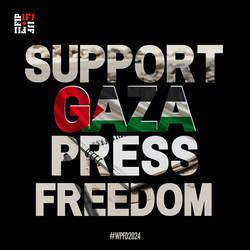
The International Federation of Journalists has listed the total of those killed in Gaza as more than 100 and recorded 17 deaths of media workers since the beginning of 2024. The names of those killed in the Gaza war can be read on the NUJ’s website today.
In a speech to the Society of Editors this week, Prime Minister Rishi Sunak acknowledged 2023 had been one of the deadliest years for journalists on record and that Freedom House, the Washington-based political advocacy organisation, has reported global freedom declined for the 18th consecutive year.
Sunak paid tribute to “all those suffering behind bars in the name of freedom and democracy,” including Evan Gershkovich, Vladimir Kara-Murza, Sergei Tikhanovsky, Jimmy Lai, Narges Mohammadi, and so many more.
In the lead up to WPFD, the BBC announced more than 300 World Service journalists – around 15 per cent of its total– are working in exile because they have relocated for their own safety. Many have left family and friends behind in places now dangerous to them, from countries such as Russia, Afghanistan and Ethiopia. On 12 April, BBC Russian correspondent, Ilya Barabanov, was labelled as a “foreign agent” by the Russian justice ministry.
Staff at BBC News Persian have been working in exile for more than a decade and continue to face harassment and persecution. Last month, the BBC World Service filed an urgent appeal to the UN alleging abuse of national security and counter-terrorism laws against BBC News Persian journalists.
The Iranian-British journalist, Pouria Zeraati, was stabbed on the street in London in March in what Michelle Stanistreet, NUJ general secretary, described as a shocking and cowardly attack. During the same month it was revealed that journalists living and working in the UK had been tried and convicted in absentia by the Islamic Revolutionary Court in Tehran on charges of “propaganda against the Islamic Republic”.
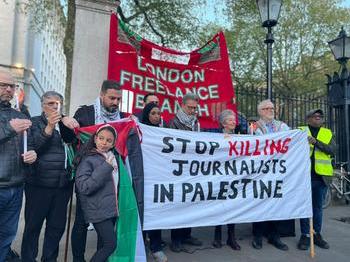
© Abdullah Bailey
This week, members of the NUJ commemorated their own comrades in events marking International Workers’ Memorial Day. The union’s London Freelance Branch held a rally in Westminster on Monday 29 April to honour the journalists killed in Gaza. Speakers included Richard Burgon MP. A statement by Tim Dawson, International Federation of Journalists’ deputy general secretary, was read out by Naomi Wimborne-Idrissi, the media officer of Jewish Voice for Labour.
The statement said: “Nearly 11 per cent of media workers in the enclave have lost their lives – a mortality rate more than six times higher than the general population. Almost all have lost their homes and are living in tents … The journalists’ predicament has been exacerbated by the exclusion of international journalists from Gaza. After 7 October, Israel sealed Gaza’s borders and has prevented outside reporters from freely entering. The IFJ’s general secretary, Anthony Bellanger, travelled to Israel in December and tried to mount a protest at the exclusion of the world’s press from Gaza. The Israeli government refused to meet with him.”
The IFJ is working to ensure that those responsible for this carnage are held to account in the International Criminal Court, Tim said, and praised journalists and their unions around the world for donating money to the IFJ for its work with the Palestinian Journalists Syndicate. The money helps provide protection for media workers, such as individual blast-trauma packs, batteries for cameras and other equipment, food and shelter. The IFJ has since announced it is setting up a new hub for journalists in Gaza.
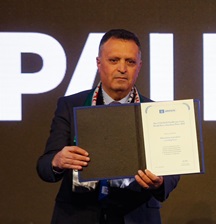
© Zuliana Lainez/IFJ
The UNESCO Guillermo Cano Prize was awarded to journalists in Gaza on Thursday 2 May in Santiago, Chile, as part of World Press Freedom Day. Nasser Abu Baker, President of the Palestinian Journalists' Syndicate and vice-president of the IFJ received the Unesco prize on behalf of his colleagues in Gaza. The prize recognised the unique suffering and fearless reporting of Gaza’s journalists. The IFJ nominated its affiliate the PJS for this award; the union will receive a $25,000 prize from UNESCO.
Nasser Abu Baker said:
“Journalists in Gaza have endured a sustained attack by the Israeli army of unprecedented ferocity – but have continued to do their jobs, as witnesses to the carnage around them. It is justified that they should be honoured on World Press Freedom Day. What we have seen in Gaza is surely the most sustained and deadly attack on press freedom in history. This award shows that the world has not forgotten and salutes their sacrifice for information.” Full story on the IFJ website
Michelle Stanistreet, NUJ general secretary, said:
“It is absolutely fitting that UNESCO has marked World Press Freedom Day by acknowledging the debt the world owes to the journalists of Gaza. It remains an outrage that Gaza’s borders remain closed to international journalists. Without the tireless work of journalists throughout Gaza, we would be blind to the terrible impact of this conflict on Gazan citizens. However, the toll of that work is a heavy one. Journalists are having to work in unimaginably challenging conditions – dealing with the loss of their homes and coping with multiple bereavements, whilst deprived of basic commodities and necessities at the same time as battling to continue their work. They are also at the sharp end of attacks, and today on World Press Freedom Day the NUJ reiterates its demand that an independent international investigation takes place to investigate the mounting evidence of journalists being deliberately targeted by Israeli forces – simply for doing their jobs.”
DONATE to the IFJ safety fund.
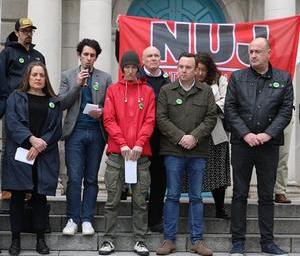
NUJ Dublin Broadcasting Branch held its third monthly minute’s silence “to honour journalists killed in Gaza and stand for the right to report freely without threats and targeting” on 29 April.
Last weekend, members in Dublin took part in a memorial at the city’s Garden of Remembrance. Séamus Dooley, NUJ Irish Secretary, and Ian McGuinness, NUJ Irish organiser, heard ICTU General Secretary, Owen Reidy, give a speech sending “solidarity to workers internationally” and calling “for safe work at home and across the world”. Later that day the NUJ held an event in Dublin on the steps of the Hugh Lane Gallery where the names of journalists killed in the Gaza Strip were read out.
Julian Assange
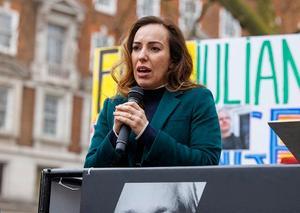
Stella Assange
© mark thomas
The case of the Wikileaks founder who faces extradition to the United States is due to be back in court on May 20. Julian Assange was given a temporary reprieve in March while judges sought further assurances from the US government, including concerning the death penalty and right to free speech. While assurances have since been given, Stella Assange described them as “weasel words”.
Michelle Stanistreet said after the last court hearing: “Assange’s prosecution by the US is for activities that are daily work for investigative journalists – finding sources with evidence of criminality and helping them to get their stories out into the world. If Assange is prosecuted, free expression the world over will be damaged.”
For more than five years Assange has been held in HMP Belmarsh. The US is seeking to prosecute him on 17 charges under the Espionage Act and one on computer hacking, relating to Wikileaks’ publication of the Afghan and Iraq war logs in 2010.
Journalism is not a crime. The Frontline Club is hosting an online panel discussion on Friday 3 May from 7- 8:30pm. Speakers: Stella Assange, human rights lawyer who was born in South Africa and married to Julian Assange; Matt Kennard an investigative journalist and co-founder of Declassified UK; Tim Dawson deputy general secretary of the International Federation of Journalists; Iain Overton is the Executive Director of Action on Armed Violence. BOOK NOW
SLAPPs
To mark World Press Freedom Day, the Bonavero Institute of Human Rights and the Centre for Freedom of the Media are hosting two panel events focusing on the threats that SLAPPs (Strategic Lawsuits against Public Participation) pose. The first focuses on the chilling effects that SLAPPs can have on journalists/ism and includes Michelle Stanistreet, NUJ general secretary. The second focuses on how SLAPPs can be tackled through legislation, focusing on legislative efforts in the UK and also abroad.
SLAPPs present a threat to media freedom in the United Kingdom as wealthy individuals and corporations improperly use the courts to silence journalists undertaking investigations. SLAPP claims are typically brought under the guise of defamation claims, but other areas of law, such as issues concerning data protection and privacy can also be used. SLAPP claims have been particularly attractive in the UK because the high costs of libel cases can financially exhaust a journalist or an organisation representing them (such as their publishing house). Additionally, the burden of proof in defamation cases rests on the defendant to prove that their statement is true and cases can go on for a lengthy period of time which emotionally exhaust journalists.
